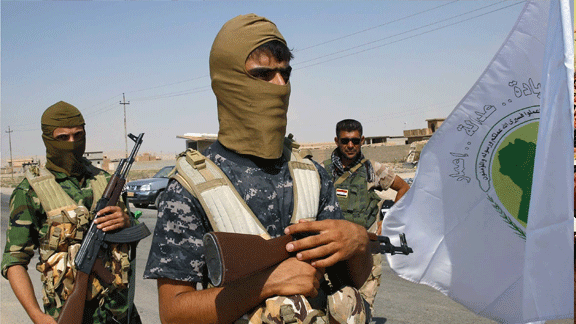Meet Abbott’s ‘boots on the ground’

The latest rush to war is being justified with rhetoric about the unique barbarism of the Islamic State and “supporting the Iraqi government” in its fight against terrorism and sectarian religious extremism.
The problem, as a new Amnesty International report makes abundantly clear, is that those being supported by US and Australian bombs are no less fanatical and murderous than the people we are helping them fight.
Media discussions of the negotiations to finalise an agreement between the Australian and Iraqi government miss a central point: the administration in Baghdad is not a national government in any meaningful sense, and its central weapon in its fight against IS is not the dysfunctional and corrupt Iraqi military, but Shiite militias that emerged during the US occupation and the sectarian civil war of 2006-07.
According to Amnesty, in recent months these militias have been abducting and killing Sunni civilians in Baghdad and around the country: “Often armed and backed by the government of Iraq, [they] continue to operate with varying degrees of cooperation from government forces – ranging from tacit consent to coordinated, or even joint, operations.”
Victims were abducted from their homes or workplace or from checkpoints. According to Amnesty: “Many were later found dead, usually handcuffed and shot in the back of the head … Photographs of several bodies shown to Amnesty International by victims’ relatives and others viewed at Baghdad’s morgue, reveal a consistent pattern of deliberate, execution-style killings.”
In Samarra, a city 125km north of Baghdad, more than 170 Sunni men have been abducted since early June. Dozens have since been found dead, the rest remain missing.
Abdul Samad, a 49-year-old taxi driver, was seized from his home in front of his family and shot dead. A neighbour who witnessed the shooting told Amnesty: “Four men dressed in black and masked dragged him out of his house … They dragged him for about 25 or 30 meters and then shot him. I could not approach to see in details as I was afraid they would see me. After they left me and his relatives went to the body; he had been shot in the head.”
As regular Iraqi forces suffer rout after rout in Anbar province, the Shiite militias have become the last line of defence of Baghdad. If IS continues its advance in the coming weeks, US air strikes will increasingly take place in coordination not with regular military forces – which are also guilty of no end of sectarian crimes against the Sunni population – but with these militias, whose savagery and sectarian outlook are comparable to that of IS.
In any case, the distinction between the militias and the regular military and police is blurry at best.
A lawyer whose relative was abducted in June in Baghdad told Amnesty that he felt unable to make inquiries: “I asked some friends to inquire but did not do so myself … Militias have a free rein in this area; they have very good relations with the police and the army and they can act with total impunity. If I go to the police and tell them what I know about my relative’s abduction by a militia they will likely learn about it and could take revenge on my family.”
The militias are closely tied to the government at the highest level. According to Amnesty, “Militia members often wear uniforms and operate both independently and alongside government forces – on the battlefield and checkpoints, and use army/security forces’ bases and detention centres – increasingly blurring the lines between them and regular forces.”
The Badr Brigades, the military wing of the Supreme Islamic Iraqi Council, is currently headed by Hadi al-Ameri, who served as transport minister in the government of former prime minister Nouri al-Maliki.
Qais al-Khaz’ali, leader of the ‘Asa’ib Ahl al-Haq militia, said in a media interview in June: “It is like any army, in that there are divisions inside it … and each one has its specialties … The military has artillery and aerial force. We have the fighters who go down on the ground and purge the areas.”
Iraqi government forces are also directly responsible for countless ongoing abuses. Udai Taha Kurdi, a 33-year-old lawyer and father of two young children, was arrested on 10 June at Baghdad Central Court. Two weeks later, his family was informed that he had died. Photos of Kurdi were examined by Derrick Pounder, a professor of forensic medicine, who concluded that his death was a result of “electrical torture”.
Sunni men interviewed by Amnesty after being detained by government forces reported the regular use of torture, including beatings with cables and sticks, repeated electric shock exacerbated by being doused in water, and the threat of rape with a stick.
In its conclusion to the report, Amnesty says: “The human rights abuses detailed in this briefing are extremely serious and some constitute war crimes, notably the widespread killings by paramilitary Shi’a militias. The Iraqi central government authorities bear a significant part of responsibility for the crimes committed by these militias.”
These are the allies of Tony Abbott and Barack Obama – the people their air forces are coordinating with and assisting as they drop ever more bombs on an already devastated country.
The last war on Iraq, if it ever really ended, set the scene for the carnage and sectarian violence that is now tearing Iraq apart. If that war sowed the soil from which IS arose, what horror will this new imperial adventure, equal parts ignorance and arrogance, create?